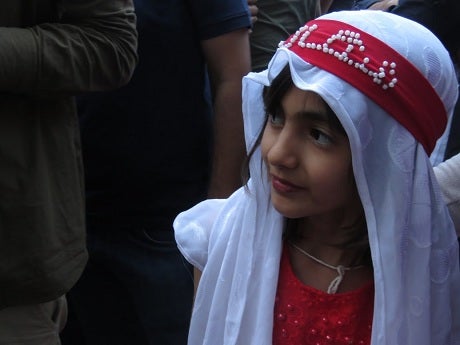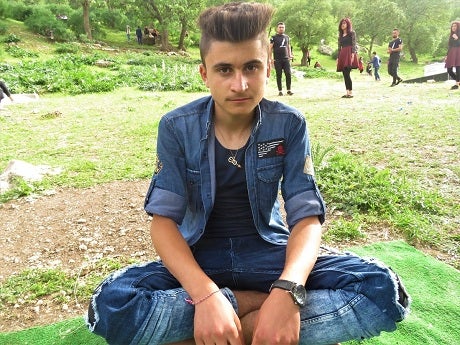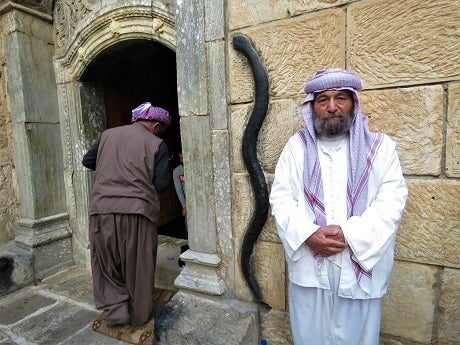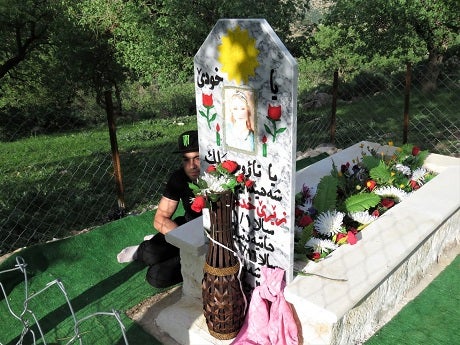“From the military point of view, yes Daesh has been defeated in Iraq but the ideology of Daesh is still there," said the brother and representative of the office of Yezidi spiritual leader Khurto Hajji Ismail, known affectionately to believers as Baba Sheikh, using the Arabic acronym for ISIS.
"Yezidis want peace in the new year but if they will not be protected in Iraq, it will be the elimination of Yezidis here, unfortunately," he added.
Baba Sheikh's office estimates that at least 20 percent of their community has moved abroad and most who fled Shingal when ISIS rose to power in 2014 are still living in camps for Internally Displaced Persons (IDPs).
"There are over 3,100 Yezidis still missing or in Daesh captivity, mostly women and children," he explained.

Jamal Jamil, 27, is one of those who escaped from the top of Mount Shingal to a border town in Syria. Once returning to Duhok he was placed in Asyan camp, where he still lives with his family.
"Yes it is a new year for the Yezidi people," Jamil said. "But there is nothing to be happy about."
"We should all be very happy and celebrate and have pleasure in our hearts," he said. "But I can tell you the majority of the Yezidi people are depressed. They feel there is no hope for a better situation as long as they live in this society."
"The United States and Europe and those organizations who care about human rights, if they really care about human rights, why do they remain silent about what the Yezidi people are still facing?" he asked.
As thousands of people visited their holy site of Lalish on Wednesday to commemorate the new year, wearing new clothes and some even dancing in the streets, it felt like a day of some relief after years of tragedies, but there was a sadness hanging over the celebrations.
One ISIS survivor, Daham Sadri, 16, told Rudaw about how he had been separated from his family in 2014. His father and older brother were immediately taken away by the extremist group, while he, his mother, and four sisters were forced to convert to Islam.
Daham Sadri
His eldest sister was quickly married off to an ISIS member within three days. Sadri, with his mother and three other sisters, were moved to Tel Afar. There they remained under ISIS rule for two years until they were able to escape.
"We hope every person who was kidnapped will be saved," Sadri said. "Next year, I hope that I can enjoy the feast of the new year with all of my family."
Sadri said that he hasn't seen his brother and father since the day they were captured. His family also has not heard anything about his sister after she was married and taken away.
He and his family live at Mam Rashan IDP camp.
Another religious leader at Lalish, Hassan Hamid, known as Amir Haj, weighed in on the feeling Yezidis have on a day that should bring happiness, but hasn't.
Amir Haj
"We feel very sad because ISIS took our girls and others and we just hope that the next year will be better," Amir Haj said. "We want to live our lives as other people."
Khero Saado Jreban visited Lalish on the sacred day, saying he hoped the best for all Yezidis.
"We are displaced here in Kurdistan and we hope to return to our homes some day or we want to move abroad," Jreban said. "We have no houses now."
Adnan Jamil, 27, originally from Shingal, came to Lalish on Yezidi new year to visit the grave of his wife Zeri Khuder Ismael.
When ISIS attacked in 2014, he was working in Erbil and his wife was staying with his family in Shingal. She was taken captive. To avoid being raped by an ISIS member, Ismael took her own life.
"I loved her for three years before we got married," he said. "And just seven months after we married, she was taken away from me."
Adnan Jamil
"The Yezidi people must leave Iraq because they don't have a life here," Jamil said, adding that he hopes to join his mother in Germany this year.
The Yezidi New Year, Sere Sal, is held on Chwarshama Soori, translated as Red Wednesday, this year falling on April 18. It marks the day that Tawuse Melek, the Peacock Angel who is God's representative on earth, descended on the holy site of Lalish to bless the earth with fertility and renewal.
Hundreds of Yezidis traveled from across the Kurdistan Region to bring in the New Year on Tuesday with the lighting of candles at sunset and visiting religious leaders. They returned again on Wednesday, the day of the feast, after coloring eggs, which symbolize rebirth.
Around 200,000 or about half of the Yezidi population in Iraq fled into the Kurdistan Region or Syria in 2014. Approximately 80-85 percent are still living in camps, primarily in Duhok province.







Comments
Rudaw moderates all comments submitted on our website. We welcome comments which are relevant to the article and encourage further discussion about the issues that matter to you. We also welcome constructive criticism about Rudaw.
To be approved for publication, however, your comments must meet our community guidelines.
We will not tolerate the following: profanity, threats, personal attacks, vulgarity, abuse (such as sexism, racism, homophobia or xenophobia), or commercial or personal promotion.
Comments that do not meet our guidelines will be rejected. Comments are not edited – they are either approved or rejected.
Post a comment